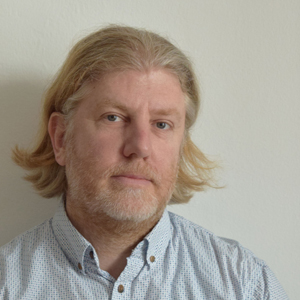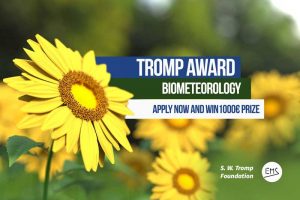Athanasios Damialis wins EMS Tromp Award

Award for an outstanding achievement in biometeorology
The EMS Tromp Award for an outstanding achievement in biometeorology 2021 will be presented to Athanasios Damialis, Head of Aerobiology Group, Department of Environmental Medicine, Faculty of Medicine, University of Augsburg, Germany. He is awarded for the publication: “Higher airborne pollen concentrations correlated with increased SARS-CoV-2 infection rates, as evidenced from 31 countries across the globe“, Proceedings of the National Academy of Sciences of the United States 2021 Vol. 118 No. 12 e2019034118; https://doi.org/10.1073/pnas.2019034118 by Athanasios Damialiset al. (*)
The prize will be presented during the EMS Annual Meeting 2021 in September 2021 at an virtual Awards Ceremony. Athanasios Damialis will also give an Award Lecture during EMS2021, foreseen to take place in the session on Biometeorology: OSA2.4: Atmospheric effects on humans.
Outline of “Higher airborne pollen concentrations correlated with increased SARS-CoV-2 infection rates, as evidenced from 31 countries across the globe”
Coexposure to airborne pollen enhances susceptibility to respiratory viral infections, regardless of the allergy status. To investigate if this could be also true for SARS-CoV-2 infections, we tested for relationships between SARS-CoV-2 infection rates and pollen concentrations, along with humidity, temperature, population density, and lockdown effects. We found that from the environmental factors examined, pollen, in synergy with humidity and temperature, explained, on average, 44% of the infection rate variability. Lockdown halved infection rates under similar pollen concentrations.
Athanasios Damialis: “My particular interest is the study, as I like to call it, of the ‘soup’ of environmental exposure and associated health impacts. Towards this direction, I focus on multiple environmental exposure, environmental health, aeroallergen detection and quantification, and forecasting all-level spatiotemporal interactions towards the aim to provide accurate and timely risk alerts. To achieve many of these challenging tasks, I also endeavour to use novel technologies in research and development.
A few days before the official announcement of the pandemic, I checked the pollen levels in a few areas in the world and was fascinated to see that we had a huge peak during a warm spell in the previous couple of days. This immediately motivated me to set up this study, to identify potential connections also with the SARS-CoV-2 virus and, of course to disseminate as soon as possible and warn high-risk groups.
I would like to thank the EMS and the Tromp Foundation for the honour to offer me this Award. In addition, my warmest and sincere gratitude go to all co-authors and colleagues, as well as the core team that supported me so decisively and effectively. Also my thanks go to the COVID-19/POLLEN Group, great partners across the world (as seen in https://pubmed.ncbi.nlm.nih.gov/33798095/), and to the ‘unknown’ scientists that fought everyday, against all odds (and still are) during this unprecedented pandemic era, to keep the society and the humankind going“.
More information about Athanasios Damialis:
Athanasios Damialis studied Forestry and Natural Environment (BSc), and Environmental Biology (MSc); he received a PhD is in Biology. Has has been engaged in research since 1996, always in the inter-disciplinary field of Aerobiology, Biometeorology and Health Impacts. More details at:
- https://orcid.org/0000-0003-2917-5667
- www.unika-t.de/lehrstuehle-und-institute-en-us/umweltmedizin-en-us/team-en-us/team/thanos-damialos
- https://www.researchgate.net/profile/Athanasios-Damialis
Tromp Foundation
 The Tromp Foundation (Foundation for Biometeorological Research), the legacy of Solco W. Tromp, is funding this award with the intention to promote biometeorology in Europe. Biometeorology is an interdisciplinary science studying the interactions between atmospheric processes and living organisms – plants, animals and humans. It provides answers to the question: How does weather and climate impact the well-being of all living beings?
The Tromp Foundation (Foundation for Biometeorological Research), the legacy of Solco W. Tromp, is funding this award with the intention to promote biometeorology in Europe. Biometeorology is an interdisciplinary science studying the interactions between atmospheric processes and living organisms – plants, animals and humans. It provides answers to the question: How does weather and climate impact the well-being of all living beings?
(*): Athanasios Damialis1*+, Stefanie Gilles1*+, Mikhail Sofiev2, Viktoria Sofieva2, Franziska Kolek1, Daniela Bayr1, Maria P. Plaza1, Vivien Leier-Wirtz1, Sigrid Kaschuba1, Lewis H. Ziska3, Leonard Bielory4,5,6, László Makra7, Maria del Mar Trigo8, COVID-19/POLLEN study group#, Claudia Traidl-Hoffmann1.


Kommentare sind geschlossen.